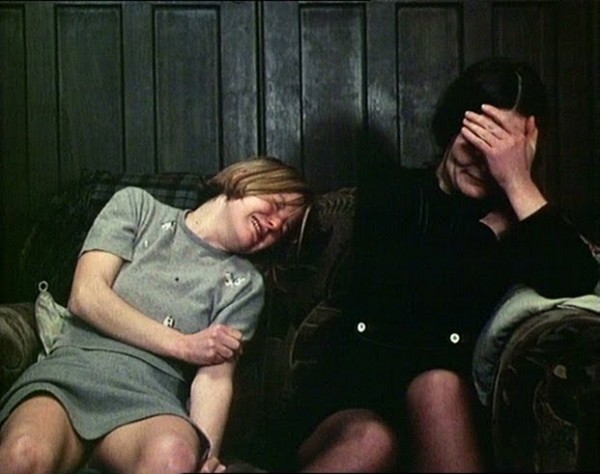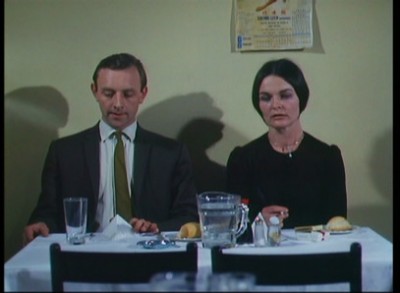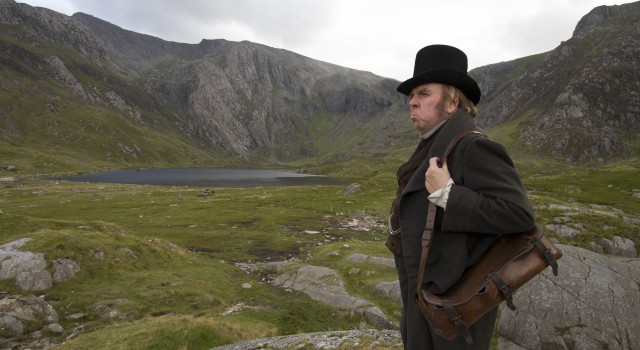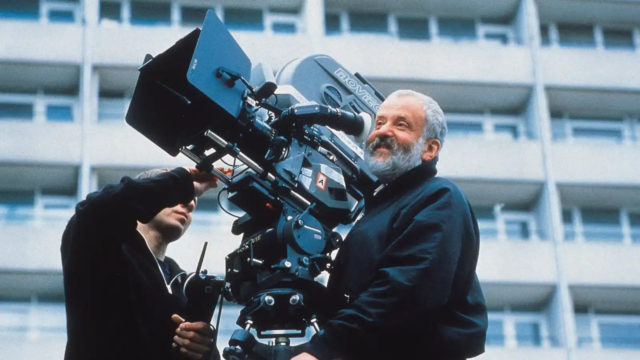
The career of Mike Leigh is celebrated in Lincoln Center retrospective
HUMAN CONDITIONS: THE FILMS OF MIKE LEIGH
Film at Lincoln Center, Walter Reade Theater
165 West 65th St. at Amsterdam Ave.
May 27 – June 8
www.filmlinc.org
For more than fifty years, British auteur Mike Leigh has been making character-driven films set in working-class worlds, anchored by memorable performances: Katrin Cartlidge in Career Girls, David Thewlis in Naked, Sally Hawkins in Happy-Go-Lucky, Jim Broadbent and Timothy Spall in Life Is Sweet, Marianne Jean-Baptiste in Secrets & Lies, Imelda Staunton in Vera Drake. His famed style involves the actors immersing themselves in their roles months and months ahead of shooting, resulting in stories steeped in reality, and humanity.
Film at Lincoln Center is honoring the seventy-nine-year-old director with the two-week retrospective “Human Conditions: The Films of Mike Leigh,” consisting of all fourteen of his features and two of his shorts (A Sense of History and The Short and Curlies), ranging from 1973’s Bleak Moments to 2018’s Peterloo. Leigh will be at the Walter Reade Theater for Q&As following the May 27 screening of the 4K restoration of Naked, the May 28 screening of a new restoration of Secrets & Lies, and the May 29 screening of a new restoration of his Gilbert & Sullivan biopic, Topsy-Turvy. Below are select reviews.
BLEAK MOMENTS (LOVING MOMENTS) (Mike Leigh, 1971)
Friday, May 27, 4:00
Saturday, May 28, 9:00
Friday, June 3, 1:00
www.filmlinc.org
British master filmmaker Mike Leigh’s feature debut, 1971’s Bleak Moments, is just that, a series of grim scenes involving five main characters who are not exactly the most scintillating of conversationalists. But slowly, the dark, dreary opening evolves into a wickedly funny black comedy about different sorts of relationships (familial, sexual, professional), comprising episodes that help define the film’s alternate title, Loving Moments. It would be hard for Sylvia (Anne Raitt) to live a more boring life. A typist at an accounting firm, she spends most of her free time at home taking care of her sister, Hilda (Sarah Stephenson), who suffers from a kind of autism. Hilda works with Pat (Joolia Cappleman), a strange bird obsessed with movies, Maltesers, and Hilda. Meanwhile, teacher Peter (Eric Allan), who seems terrified of people, shows interest, if you can call it that, in all three women. And Norman (Mike Bradwell), a wannabe singer-songwriter, has moved into Sylvia’s garage, where he plays music that intrigues Hilda. Over a short period of time, the three women and two men sit around, go for walks, eat, drink, and, mostly, say very little to one another, their tentativeness palpable, each one terribly frightened in his or her own way of what life has to offer, of connecting. But Leigh isn’t making fun of them; instead, Bleak Moments is a lovingly drawn story of real life, where people don’t always know exactly what to say or do or how to react in various situations.
Originally mounted as a stage production, Bleak Moments transitioned to the big screen with the financial help of Albert Finney. As became his trademark, Leigh had the actors first embody the roles in rehearsals and preparation, giving the film a believability despite the absurdity of it all. The overwhelming despair and hesitation demonstrated by the characters becomes painfully funny, especially when Peter takes Sylvia to a Chinese restaurant and, afterward, she tries to ply him with sherry.
In January 2013, Leigh discussed Bleak Moments with the Guardian, at first comparing it to watching paint dry and acknowledging that some people thought it was “the most boring film in the world” while also explaining, “From this distance, I cautiously feel I’m allowed to feel a touch of paternal pride in my young self. With such brief life experience, did I really invent this painful, tragic-comic tale of a beautiful but suppressed young woman, tied to her elder, mentally challenged sister? I guess I’m astonished at the maturity and sophistication of my achievement, not to mention its pathos and irony. . . . I’ve tried to vary my films considerably, but I would have to admit that Bleak Moments remains, in some ways, the mother of all Mike Leigh films. And I’m very proud of it.” As well he should be.

Sally Hawkins is unforgettable in Mike Leigh’s Happy-Go-Lucky
HAPPY-GO-LUCKY (Mike Leigh, 2008)
Sunday, May 29, 9:00
Friday, June 3, 3:30
www.filmlinc.org
Mike Leigh’s Happy-Go-Lucky is the most charming of all his films. Sally Hawkins gives a career-making performance as Poppy, the most delightful film character since Audrey Tatou’s Amélie (in Jean-Pierre Jeunet’s 2001 French comedy Le Fabuleux Destin D’amélie Poulain). Poppy is a primary school teacher who has an endearing, seemingly limitless love of life; she talks playfully with strangers in bookstores, teases her sister (Kate O’Flynn) and best friend (Alexis Zegerman) with the sweetest of smirks, takes a flamenco lesson on a whim with a colleague, and, when her bicycle is stolen, simply starts taking driving lessons.
However, her driving instructor, Scott (Eddie Marsan), is a tense, angry man with endless chips on his shoulder, trying to sour Poppy at every turn. But Poppy is no mere coquettish ingenue; when she senses a problem with one of her students, she is quick to get to the bottom of the situation, with the appropriate serious demeanor. As with most Leigh films, much of the dialogue is improvised (following long rehearsal periods), adding to its freshness. But also as with most Leigh films, there are dramatic turning points, but even those can’t wipe away Poppy’s — or the audience’s — endless smile.
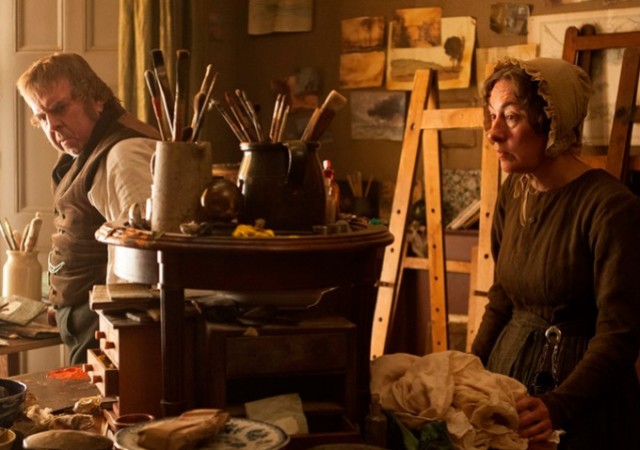
British painter J. M. W. Turner (Timothy Spall) and his devoted housekeeper, Hanna Danby (Dorothy Atkinson), pause for a moment in biopic
MR. TURNER (Mike Leigh, 2014)
Sunday, June 5, 2:00
Wednesday, June 8, 3:30
www.filmlinc.org
Timothy Spall was named Best Actor at the Cannes Film Festival for his compelling portrayal of British artist Joseph Mallord William Turner in Mike Leigh’s lovely biopic, Mr. Turner. Spall, who played Peter Pettigrew in the Harry Potter series and has appeared in such other Leigh films as Topsy-Turvy, All or Nothing, Life Is Sweet, and Secrets & Lies, portrays Turner as a gruff, self-involved painter who grunts and growls his way through life. At his home studio he is assisted by his aging father, William (Paul Jesson), and his devoted housekeeper, Hanna Danby (Dorothy Atkinson), who he occasionally shags when in the mood. Turner carries his sketchbook wherever he goes, always on the look-out for a beautiful landscape or winter storm that could become the subject of his next painting. With that in mind, he rents a room in a small seaside inn run by Sophia Booth (Marion Bailey), who eventually becomes more than just his landlady. An artist well ahead of his time, Turner becomes frustrated with the men at the Royal Academy of Arts and lisping art critic John Ruskin (Joshua McGuire), who don’t appreciate his work properly, especially when he starts heading toward abstraction.
Leigh does not paint the kindest portrait of J. M. W. Turner, who turned his back on his former mistress, the shrill Sarah Danby (Ruth Sheen), and their two daughters (Sandy Foster and Amy Dawson); doesn’t have the nicest things to say about such contemporaries as John Constable (James Fleet) and Benjamin Haydon (Martin Savage); and won’t listen to the stern warnings of his doctor (David Horovitch). Turner is an artist first and foremost; everything else takes a backseat in his life. Despite being based on actual events, the film was made in Leigh’s usual style, with the actors improvising within set scenes; Spall, who studied painting for two years in preparing for the role, takes full advantage of the opportunity, often refusing to articulate, grunting and growling as he deals with other people who dare share their thoughts and opinions with him. It’s a very funny conceit that helps define a rather unusual character.
As befits a story about a masterful painter, cinematographer Dick Pope, who has shot most of Leigh’s films, beautifully photographs the sun rising and setting over vast landscapes, capturing its glowing light cast over the sea. Leigh keeps the narrative subtle, as when Turner and Sophia sit for a daguerreotype; almost nothing extraordinary happens in the scene, but from a few groaned questions and Spall’s expression, viewers can sense Turner realizing the changes that photography will bring to realist painting, spurring his controversial switch to more abstract canvases. It is not shown as a eureka moment but just another part of Turner’s development in becoming one of the most important and influential artists of the nineteenth century. And then there are the paintings themselves, glorious works that are always a joy to see, especially in a film that is a work of art itself.
